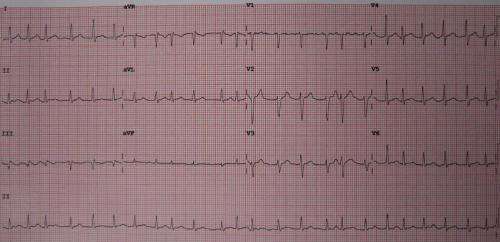This article has been reviewed according to Science X's editorial process and policies. Editors have highlighted the following attributes while ensuring the content's credibility:
fact-checked
peer-reviewed publication
trusted source
proofread
Cognitive behavioral therapy shown to improve quality of life in patients with atrial fibrillation

Online cognitive behavioral therapy (CBT) shows promising effects on quality of life, as well as reduced health care consumption for patients with paroxysmal (i.e., intermittent) symptomatic atrial fibrillation, according to a new study in the Journal of the American College of Cardiology. According to the researchers, this is the world's first randomized controlled trial of CBT for patients with atrial fibrillation (AF).
What does the study show?
"Online CBT showed large effects on AF-specific quality of life (QoL), self-rated AF symptoms, cardiac anxiety, as well as reduced health care consumption compared to the control group. After the treatment, the participants were able to engage in physical and social activities to a larger extent.
"The effects on AF-specific QoL are comparable to recent trials of nvasive interventions and pharmacological treatment. The results were sustained 12 months after treatment," says Josefin Särnholm, researcher and psychologist at the Department of Clinical Neuroscience at Karolinska Institutet.
Why are the results important?
"Atrial fibrillation affects three percent of the population and may lead to severe and disabling symptoms such as palpitations, shortness of breath and chest pain, as well as low quality of life. Medical treatment has limited effect on the symptoms and can cause serious side effects. Therefore, other treatment options are needed. CBT via the internet can be made available to many patients and integrated as an additive treatment to AF routine care," Särnholm says.
How did you conduct the study?
Särnholm says, "After cardiac and psychological assessment, 127 patients diagnosed with intermittent symptomatic AF were randomized to ten weeks of internet CBT or to receive AF education. The CBT treatment aims to reduce fear of cardiac-related symptoms and AF-related avoidance behavior, of for example social situations and physical activity, that is common to develop when living AF. The participants completed a self-assessment before, during and three months after treatment. The CBT group was followed 12 months after treatment. The AF burden was also measured using long-term ECG."
What is the next step in your research?
"We have conducted another randomized controlled trial in which we compared AF-CBT with an active control group offered a treatment focusing on reducing stress. We are now analyzing the data. We also aim to implement the treatment at Karolinska University Hospital and hope to offer it nationally in the near future," says Särnholm.
More information: Josefin Särnholm et al, Cognitive Behavioral Therapy Improves Quality of Life in Patients With Symptomatic Paroxysmal Atrial Fibrillation, Journal of the American College of Cardiology (2023). DOI: 10.1016/j.jacc.2023.04.044


















